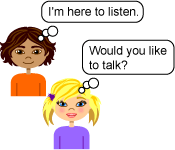|
|
|
|
|
GRIEF AND LOSS
Back to top
HOW CAN I TELL IF SOMEONE MIGHT BE EXPERIENCING GRIEF OR LOSS?
There are many different types of loss that can cause a person to grieve: the death of a loved one (including pets), a breakup, a parent, sibling, or friend moving away. Grief is a normal emotion. People react to loss in different ways, they may feel, think, or act in ways that they might not have before. The emotional, physical, or behavioral reactions, though different, are considered normal in the days, weeks, and months after a loss.
If you are worried that someone might be struggling with a loss, here are some things you might look for:
| Not doing things he/she typically likes to do
|
Feeling intense emotions such as anger or sadness
|
| Isolation from other people or seeming distant
|
Feeling shocked, numb, empty or "unreal"
|
| Change in eating (eating more or less)
|
Feeling extreme anxiety, panic, sadness, and helplessness
|
| Change in sleeping
|
Crying or not showing emotions at all
|
| lack of energy or feeling tired
|
Feeling moody, angry, betrayed
|
| Difficulties in school (not completing homework, missing school, problems with peers)
|
Shocked, confused, unprepared
|
| Difficulty concentrating or studying
|
Questioning why someone has died
|
| Relief
|
 Back to top
Back to top
HOW CAN I ENCOURAGE SOMEONE TO GET HELP?
Helping a friend who is grieving can be challenging. It is normal to feel many different emotions (overwhelmed, confused, and angry) when you try to help someone, especially if they don't understand that you are trying to help. Helping a friend does not mean you are responsible for fixing his or her problems. If your friend wants to talk, listen. What you can do is be supportive and encourage your friend to get help from adults who he or she can talk to. Friends who have experienced a loss need to feel safe and loved and need to know that there are people in their lives that are there for them. You do not have to have all the answers or be an expert - just be a good listener.
Back to top
WHAT MIGHT BE HELPFUL?
- Attending memorial services, funerals, and other traditions can help people get through the first few days and honor the person who died.
- While there are no magic words that can heal someone's pain, letting your friend know that you are here for them and that you care can be very helpful. Here are some things you could say: "I'm sorry for your loss." "I care about you." "Is there anything I can do to help?" "I'm here to listen if you want to talk, or just spend time together if you don't want to talk."
- Allow them to grieve at their own pace. The grieving process takes time and some days may be better than others.
- Sometimes it can feel really hard to talk. That is okay. Expressing feelings and thoughts can help someone deal with the pain of a loss. Writing in a journal about your feelings and thoughts and memories. Writing a poem or song as a tribute.
- Exercise and healthy eating.
- Offer your friend choices for how to get help, including websites, phone numbers for hotlines, or numbers for helpful adults in school or in the community and support groups he or she can join.
- If you think a friend needs help, encourage him/her to get help from a professional. Do not try to solve the problem yourself, but instead offer to help with making phone calls or going to appointments.
- When you are really worried about someone's safety, it is ok to talk to them about it. If you are worried about your friend's safety - ask and listen! Suicide hotline: 1-800-273-TALK*
Back to top
WHAT MIGHT NOT BE SO HELPFUL?

- Drinking, using drugs, cutting
- Keeping your feelings or worries to yourself or trying not to feel
- Trying to solve your friend's problems by yourself is not helpful for him/her or for you. Always seek professional advice and support from a trusted adult.
- Saying things like "Get over it" "Just try harder" "I know exactly how you feel" or "You're being too sensitive or dramatic"
Disclaimer: Material in Whyville's Wellness Center is intended as general information. It is not a recommendation for treatment,
nor should it be considered medical or mental health advice. Whyville's Wellness Center urges families to discuss all information
and questions related to medical or mental health care with a health care professional.
|
|
|
|
|